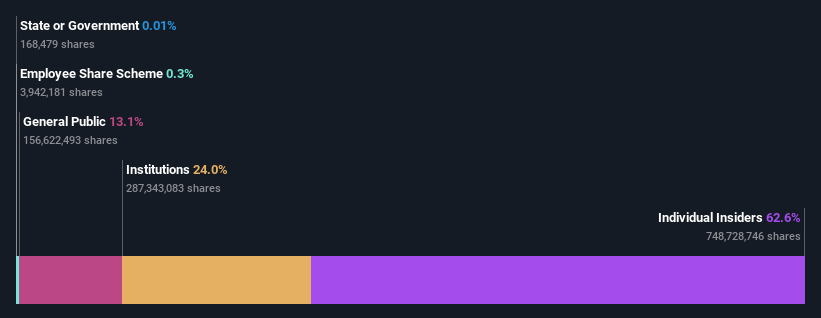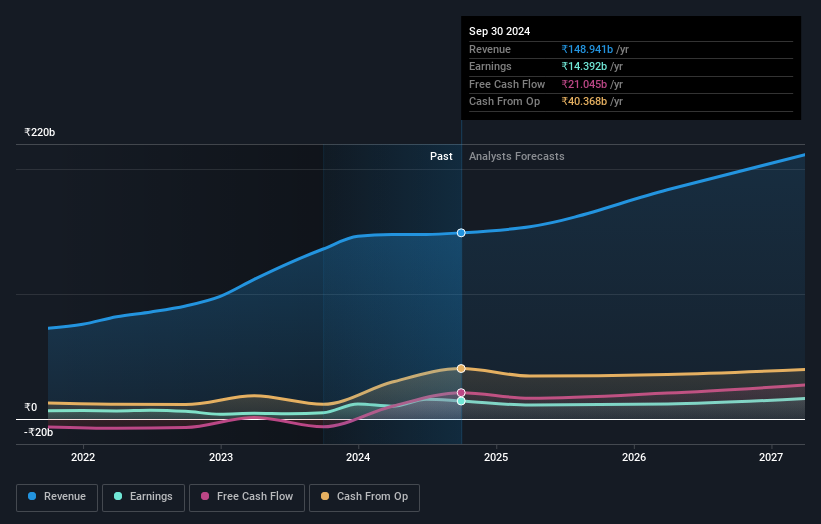Biocon Limited (NSE:BIOCON) Top Key Executive Kiran Mazumdar-Shaw, the company's largest shareholder sees 5.4%reduction in holdings value
Key Insights
- Biocon's significant insider ownership suggests inherent interests in company's expansion
- A total of 2 investors have a majority stake in the company with 60% ownership
- Institutions own 24% of Biocon
Every investor in Biocon Limited (NSE:BIOCON) should be aware of the most powerful shareholder groups. And the group that holds the biggest piece of the pie are individual insiders with 63% ownership. In other words, the group stands to gain the most (or lose the most) from their investment into the company.
As a result, insiders as a group endured the highest losses after market cap fell by ₹24b.
Let's take a closer look to see what the different types of shareholders can tell us about Biocon.
View our latest analysis for Biocon

What Does The Institutional Ownership Tell Us About Biocon?
Institutions typically measure themselves against a benchmark when reporting to their own investors, so they often become more enthusiastic about a stock once it's included in a major index. We would expect most companies to have some institutions on the register, especially if they are growing.
As you can see, institutional investors have a fair amount of stake in Biocon. This can indicate that the company has a certain degree of credibility in the investment community. However, it is best to be wary of relying on the supposed validation that comes with institutional investors. They too, get it wrong sometimes. When multiple institutions own a stock, there's always a risk that they are in a 'crowded trade'. When such a trade goes wrong, multiple parties may compete to sell stock fast. This risk is higher in a company without a history of growth. You can see Biocon's historic earnings and revenue below, but keep in mind there's always more to the story.

Hedge funds don't have many shares in Biocon. Because actions speak louder than words, we consider it a good sign when insiders own a significant stake in a company. In Biocon's case, its Top Key Executive, Kiran Mazumdar-Shaw, is the largest shareholder, holding 40% of shares outstanding. For context, the second largest shareholder holds about 20% of the shares outstanding, followed by an ownership of 5.1% by the third-largest shareholder.
A more detailed study of the shareholder registry showed us that 2 of the top shareholders have a considerable amount of ownership in the company, via their 60% stake.
Researching institutional ownership is a good way to gauge and filter a stock's expected performance. The same can be achieved by studying analyst sentiments. There are a reasonable number of analysts covering the stock, so it might be useful to find out their aggregate view on the future.
Insider Ownership Of Biocon
The definition of company insiders can be subjective and does vary between jurisdictions. Our data reflects individual insiders, capturing board members at the very least. Company management run the business, but the CEO will answer to the board, even if he or she is a member of it.
Insider ownership is positive when it signals leadership are thinking like the true owners of the company. However, high insider ownership can also give immense power to a small group within the company. This can be negative in some circumstances.
Our most recent data indicates that insiders own the majority of Biocon Limited. This means they can collectively make decisions for the company. That means insiders have a very meaningful ₹261b stake in this ₹417b business. Most would argue this is a positive, showing strong alignment with shareholders. You can click here to see if they have been selling down their stake.
General Public Ownership
With a 13% ownership, the general public, mostly comprising of individual investors, have some degree of sway over Biocon. While this size of ownership may not be enough to sway a policy decision in their favour, they can still make a collective impact on company policies.
Next Steps:
I find it very interesting to look at who exactly owns a company. But to truly gain insight, we need to consider other information, too. Case in point: We've spotted 2 warning signs for Biocon you should be aware of, and 1 of them can't be ignored.
If you are like me, you may want to think about whether this company will grow or shrink. Luckily, you can check this free report showing analyst forecasts for its future.
NB: Figures in this article are calculated using data from the last twelve months, which refer to the 12-month period ending on the last date of the month the financial statement is dated. This may not be consistent with full year annual report figures.
Valuation is complex, but we're here to simplify it.
Discover if Biocon might be undervalued or overvalued with our detailed analysis, featuring fair value estimates, potential risks, dividends, insider trades, and its financial condition.
Access Free AnalysisHave feedback on this article? Concerned about the content? Get in touch with us directly. Alternatively, email editorial-team (at) simplywallst.com.
This article by Simply Wall St is general in nature. We provide commentary based on historical data and analyst forecasts only using an unbiased methodology and our articles are not intended to be financial advice. It does not constitute a recommendation to buy or sell any stock, and does not take account of your objectives, or your financial situation. We aim to bring you long-term focused analysis driven by fundamental data. Note that our analysis may not factor in the latest price-sensitive company announcements or qualitative material. Simply Wall St has no position in any stocks mentioned.
About NSEI:BIOCON
Biocon
Manufactures and sells biotechnology products and research services in India, the United States, Ireland, rest of the European Union, and internationally.
Reasonable growth potential with low risk.
Similar Companies
Market Insights
Community Narratives



